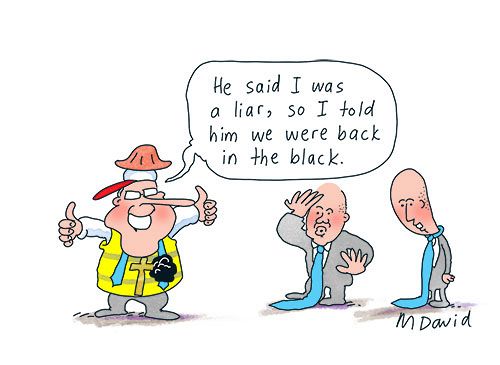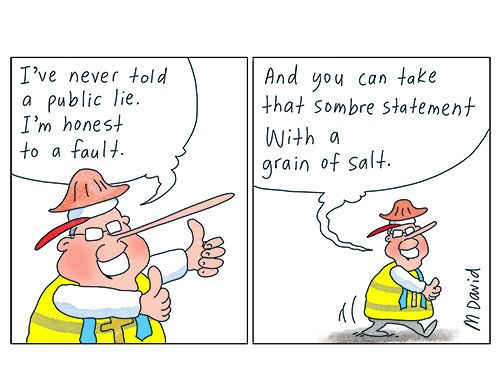Recent economic data brings the tally of failures in economic management by Prime Minister Morrison and Treasurer Frydenberg to 40, as Alan Austin documents.
WORLD BANK DATA shows the value of manufacturing in Australia as a percentage of gross domestic product (GDP) was 13.83% when that dataset began in 1990. It stayed above 12% until 1999, when a decline began.
This fell to an all-time low of 5.64% in 2019, six years after the Coalition was elected on promises to 're-invigorate manufacturing industry'. The 2020 level was 5.72%, the second-lowest ever.
The Australian Sovereign Capability Alliance reports that Australia now has the lowest manufacturing self-sufficiency of any country in the Organisation for Economic Cooperation and Development (OECD).
This brings to an even forty the outcomes under the current federal Government which are “worst ever” or “worst for a very long time”.
The first ten are listed here, with links to the raw data. The second ten are here and the third ten here.
The collapse in manufacturing was number 40. The dismal count continues.
Worst collapse in total construction since records began
The Australian Bureau of Statistics (ABS) shows the long-term upwards slope of construction volumes in Australia dramatically reversed in 2015. For the first time since records began in 1974, total construction has fallen for six out of the last seven years. This is almost certainly the only time this has happened since Captain Arthur Phillip built the first colonial houses in 1788.
Lowest investment in social housing on record
Of all prime ministers over the last 30 years, Malcolm Turnbull and ScottMorrison have been by far the worst in building affordable houses for low income Australians. As we saw recently, this is based on ABS home starts and population data.
Worst collapse in investment in port infrastructure on record
The OECD tracks spending over time on transport infrastructure, including rail, roads, inland waterways and ports. Investment in all of these has declined substantially under the Coalition since 2013, despite urgent needs and despite vast borrowings.
The pink chart, below, shows port investment in 2018 was just 0.048% of GDP, a miserable one tenth of the 0.48% allocated in 2012.
Worst inflation ranking on record
Through the last financial year, Australia’s 3.85% inflation hike ranked 31st among the 38 developed OECD countries. That is Australia’s lowest ranking ever. During the Keating years, Australia ranked first.
Lowest share of national income going to workers
Quarterly accounts from the ABS show the share of gross national income going to workers hit an all-time low of 49% in June last year. This has been below 51.5% for the last five quarters. The last time that happened was in 1964.
Lowest rate of growth of household income on record
This is the first generation of Australians which cannot expect to be better off than their parents. ABS data starting back in 1959, in the Menzies years, shows us the average percentage increase in annual household income for each prime minister.
The chart below shows Labor periods in red and the Coalition in blue. The last eight years have been the worst on record.
Most disastrous surge in house prices on record
As already detailed, house values in many cities and regional areas have more than doubled under the current Government. This has locked countless first home buyers out of the housing market, probably forever, while multiplying the profits of rich property speculators.
Slowest take-up of clean vehicles in the developed world
Australia has the lowest sales of electric vehicles as a percentage of all vehicles sold in the OECD. Australia’s puny 2% compares with 40% in Sweden, 55% in Iceland and 83% in Norway.
Lowest level of imports as a percentage of exports
Every country applies its export revenue to imports of goods and services to secure a higher standard of living, including better medical facilities, more efficient transport, updated household electronics and greater travel and leisure.
Since ABS records began in 1971, Australians have been able to import significantly more than the value of exports. The long-term average has been 105.8%.
Until 2017. Over the last five years of booming exports, the return to Australians has steadily declined. The ratio of imports to exports fell to 97.6% in 2017, then to an all-time low of 80.6% in 2019 and fresh new lows in 2020 and 2021.
This is one of the clearest graphic representations of the extent to which the current Government is allowing vast wealth and income to be shunted straight offshore, with ever-diminishing returns to the Australian people.
Worst collapse in manufacturing on record
As stated in the opening paragraphs above, manufacturing was once a key sector in the Australian economy. It employed multitudes of workers and generated economic activity. Consecutive Coalition governments, including Morrison's current one, have all but secured the demise of this once important industry.
How much worse can this get?
This deterioration in Australia’s economy is not, on the whole, attributable to the pandemic. The collapse in nearly all these outcomes was evident long before COVID. It is attributable to unconscionable waste, incompetence and corruption.
Between now and the next election, more data will arrive. Will Australia reach fifty “all-time worst” economic outcomes by then? Unfortunately, this seems likely.
Alan Austin is an Independent Australia columnist and freelance journalist. You can follow him on Twitter @alanaustin001.
Related Articles
- Corruption and extremism threaten government legitimacy
- From climate to corruption, the Morrison Government needs to go
- The Plan: Winking, blinding and eye-watering Coalition negligence
- Government unaccountability: Over 1,000 days and counting
- Australia needs an ICAC, but also mandatory gaol sentences
 This work is licensed under a Creative Commons Attribution-NonCommercial-NoDerivs 3.0 Australia License
This work is licensed under a Creative Commons Attribution-NonCommercial-NoDerivs 3.0 Australia License
Support independent journalism Subscribe to IA.














